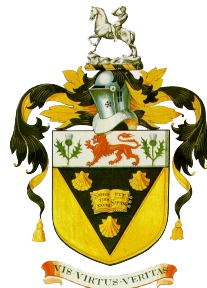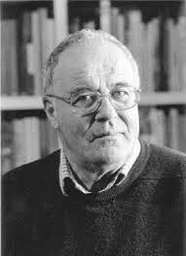Related Research Articles

The University of Fort Hare is a public university in Alice, Eastern Cape, South Africa.

Rhodes University is a public research university located in Makhanda (Grahamstown) in the Eastern Cape Province of South Africa. It is one of four universities in the province.

African studies is the study of Africa, especially the continent's cultures and societies. The field includes the study of Africa's history, demography, culture, politics, economy, languages, and religion. A specialist in African studies is often referred to as an "Africanist".
Roland Anthony Oliver FBA was an Indian-born English academic and Emeritus Professor of African history at the University of London.

Toyin Omoyeni Falola is a Nigerian historian and professor of African Studies. Falola is a Fellow of the Historical Society of Nigeria and of the Nigerian Academy of Letters, and has served as the president of the African Studies Association. He is currently the Jacob and Frances Sanger Mossiker Chair in the Humanities at the University of Texas at Austin.
Dame Margery Freda Perham was a British historian of, and writer on, African affairs. She was known especially for the intellectual force of her arguments in favour of British decolonisation in the 1950s and 1960s.
Anthony Hamilton Millard Kirk-Greene CMG MBE was a British historian and ethnographer best known for his works on Nigerian history and the history of British colonial administration in Africa. After a career as a colonial official, Kirk-Greene became a fellow of St Antony's College, Oxford, where he was lecturer in the modern history of Africa from 1967 to 1992. He was president of the African Studies Association of the UK from 1988 to 1990 and vice-president of the Royal African Society.
Kwesi Kwaa Prah is an author, public speaker, and a Sociology professor, who was born in Ghana and has been based in southern Africa since the 1980s. He is the author of several books, including Beyond The Color Line (1997). He has also published many articles revolving around the topics of Africa's history and what is to come in Africa's future, as well as speaking and writing on issues such as the education system and social reforms. He is vocal about the race issues in society, speaking publicly and challenging government actions. He is the founder and Director of the Centre for Advanced Studies of African Society (CASAS). He has worked in a number of universities in Africa, Europe and Asia, researching and teaching Sociology and Anthropology.
Wale Adebanwi is a Nigerian-born first Black Rhodes Professor at St Antony's College, Oxford where he was, until June 2021, a Professor of Race Relations, and the Director of the African Studies Centre, School of Interdisciplinary Area Studies, and a Governing Board Fellow. He is currently a Presidential Penn Compact Professor of Africana Studies at the University of Pennsylvania. Adebanwi's research focuses on a range of topics in the areas of social change, nationalism and ethnicity, race relations, identity politics, elites and cultural politics, democratic process, newspaper press and spatial politics in Africa.

Henning Melber is a German political scientist and sociologist. He is a German-Namibian and Swedish Africanist and political activist.
The African Studies Association of the United Kingdom (ASAUK) formed in 1963 "to advance African studies, particularly in the United Kingdom, by providing facilities for the interchange of information and ideas and the co-ordination of activities by and between persons and institutions concerned with the study of Africa." Antony Allott and Roland Oliver led the founding of the group. In recent times the Royal African Society administers the association.
Paulo Fernando de Moraes Farias, FBA, is a Brazilian historian and Africanist specialising in epigraphic sources for the medieval history of West Africa as well as West African oral traditions and the Timbuktu Chronicles. Since his retirement in 2003, he has been Honorary Professor at the Department of African Studies and Anthropology at the University of Birmingham. After graduating from the Federal University of Bahia, Brazil, in 1963, Moreas Farias taught at Bahia's Centre for Afro-Oriental Studies and at the Central College of Salvador; his association with the National Union of Students (Brazil) led to harassment from the military government of Brazil after 1964, prompting him to flee to Africa. Settling with his family in Ghana, he completed a Master of Arts degree at the University of Ghana, but fled once again to Senegal and then Nigeria following the Ghanaian coup of 1966; two years later, he took up an academic post at the University of Birmingham in the United Kingdom, where he remained until retiring in 2003.

John David Yeadon Peel was a British Africanist, sociologist and historian of religion in Africa, particularly Nigeria. He was most notable for his series of major studies of historical patterns of religious belief among the Yoruba people.
Alfred Babatunde 'Tunde' Zack-Williams is a British Emeritus Professor of Sociology and Research Degrees Tutor at the University of Central Lancashire (UCLAN). He is an Africanist and a political scientist. He obtained a Bachelor of Arts degree at the University of Liverpool and a MSc at the University of Salford, both in sociology. His PhD thesis with the University of Sheffield was entitled Underdevelopment and Diamond Mining in Sierra Leone. Previously, Zack-Williams taught sociology at Bayero University Kano in 1979 and the University of Jos in Nigeria, and performed fieldwork research in Ghana, Nigeria, and Sierra Leone. He published extensively on Sierra Leone and West Africa.
Douglas Rimmer was an economist and historian focusing on post-colonial West Africa. He first taught at the University College of the Gold Coast and was a founding member of the Centre of West African Studies at Birmingham University in 1963, where he became Director in 1983. Rimmer served the Royal African Society (RAS) for twenty years in various roles such as President (1986-1988). In 2001 he received the RAS/ASAUK Distinguished Africanist Award.
John M. Lonsdale is a British Africanist and historian. He is Emeritus Professor of Modern African History at the Centre of African Studies in the Faculty of History at the University of Cambridge. He is a Fellow of Trinity College there. As a schoolboy, he spent three summer holidays during 1953-1956 in Kenya where his father had just taken a job. He read history at Cambridge from 1958 through 1964. In 1956 he started his national service as a subaltern in the King's African Rifles. His first teaching job was in Dar es Salaam in 1964. Lonsdale studied the modern history of Kenya extensively and won the Outstanding African Studies Award of the African Studies Association of the United Kingdom in 2006.
Insa Nolte is an Africanist and Professor of African Studies in the Department of African Studies and Anthropology at the University of Birmingham. She obtained a first degree in Economics from the Free University of Berlin (FUBerlin) and graduated from the University of Birmingham with a PhD thesis on the history and politics of Ijebu-Remo, the regional base of the Nigerian Nationalist politician Obafemi Awolowo. After a Kirk-Greene Junior Research Fellowship at St Antony's College, Oxford, she became Lecturer in African Studies at Birmingham University in 2001. She has been Head of Department since 2018. Her research focuses on Yoruba history, culture and politics. Nolte was a president of the African Studies Association of the United Kingdom from 2016 to 2018.
Nici Nelson is an Africanist, social anthropologist and a Honorary Research Fellow in the Department of Anthropology at Goldsmiths, University of London. She obtained a PhD on Kikuyu women in Nairobi, Kenya, from the University of London in 1978 and has published on various fields such as urban anthropology, gender and sexuality, and marriage and households in East Africa. Nelson was President of the African Studies Association of the United Kingdom (ASAUK) in the years 2002-2004 and was one of the recipients of the ASAUK Outstanding African Studies Award in 2015-2016.

Kenneth James King is since September 2005 Professor Emeritus of International and Comparative Education at the University of Edinburgh. He is a historian, an Africanist and former Director of the Centre of African Studies (CAS) at Edinburgh. King obtained a Bachelor of Arts Classical Tripos from the University of Cambridge, and a Postgraduate Certificate in Education at the Institute of Education, London. He taught African History at a secondary school in Addis Abeba, Ethiopia, and earned a PhD degree in African history at the University of Edinburgh in 1968. He then worked at the University of Nairobi before returning to Edinburgh, where he was a Lecturer, Reader and Professor. In 1978 he was seconded for four years to the International Development Research Centre (IDRC) in Ottawa, Canada. Kenneth King and his wife Pravina King Khilnani were both presented with the 2011/2012 Distinguished Africanist Award of the African Studies Association of the United Kingdom (ASAUK). King has researched the small scale informal sector enterprises in Kenya over a 20-year period, and more recently studied India-Africa cooperation in human resource development, especially in Kenya, Ethiopia and South Africa, and China's aid policies towards Africa.
References
- 1 2 3 "Author Gavin Williams". africanbookscollective.com. Retrieved 1 September 2022.
- ↑ "About Gavin Williams" (PDF). ru.ac.za. Rhodes University. Retrieved 1 September 2022.
- ↑ "26 August A Hero Remembered. Dr AB Xuma memorial lecture". ru.ac.za. Rhodes University. August 2010. Retrieved 1 September 2022.
- 1 2 "Gavin Williams Emeritus Fellow of St Peter's College, University of Oxford". scholar.google.co.za. Google Scholar. Retrieved 1 September 2022.
- ↑ "Institute of Social and Economic Research (ISER)" (PDF). ru.ac.za. Rhodes University. 2015. Retrieved 1 September 2022.
- ↑ "Outstanding African Studies Award". www.asauk.net/awards-prizes. African Studies Association of the United Kingdom. Retrieved 1 September 2022.
- ↑ "SPECIAL ISSUE: MARKETS AND IDENTITIES IN AFRICA: HONOURING GAVIN WILLIAMS (June 2012). Review of African Political Economy, vol. 39 No. 132". jstor.org. Taylor & Francis, Ltd. June 2012. JSTOR 42003272 . Retrieved 1 September 2022.
- ↑ "Williams, Gavin". Worldcat.org. OCLC . Retrieved 5 October 2024.
- ↑ "Dr. Gavin Williams". gavinwilliams.org. Gavin Williams. Retrieved 1 September 2022.
- ↑ Williams, Gavin (1996). "Setting the Agenda: A Critique of the World Bank's Rural Restructuring Programme for South Africa". Journal of Southern African Studies. 22 (1): 139–166. doi:10.1080/03057079608708482. JSTOR 2637008.